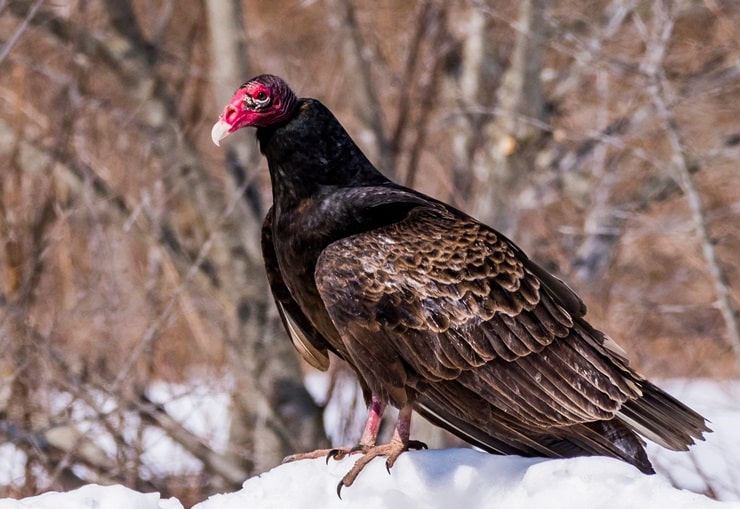Vultures are large birds of prey that scavenge on dead animals. They have wide wingspans and distinctive bald, featherless heads. They do not have a voice box, so they can only make hissing and grunting noises.
Table of Contents
Vultures typically congregate in groups. These groups of vultures have various collective nouns, depending on where they are. The primary collective noun for vultures is a flock.
Additional collective nouns for vultures include:
- Vortex
- Colony
- Cast
- Family
- Flight
- Rookery
- Congregation
- Rout
- Volume
- Solitary
- Meal
- Soar
- Looming
Two distantly related families of vultures are distributed throughout the world. The New World vultures are found throughout the Americas, from Canada to Argentina. These vultures include species such as Turkey Vultures, Black Vultures, and King Vultures.
Old World Vultures are distributed throughout Europe, Asia, and Africa. The vultures included in this group include Bearded Vultures, Egyptian Vultures, and Griffon Vultures. Twice as many Old World Vultures exist compared to New World Vultures.

What Is A Group Of Flying Vultures Called?
Vultures are often seen flying within a large group, circling above a specific area. They use rising thermals to stay aloft without expending much energy while they search for food. These groups of flying vultures are called kettles.
Scientists have traditionally thought that vultures only use visual cues to find food. New research, however, has shown that some vultures also use auditory cues from dying animals to find carcasses to eat.
What Is A Group Of Roosting Vultures Called?
When vultures are at rest, they sit or roost on the ground, on trees, or atop other structures in groups. While resting, they usually spread their wings out, soaking in the sun’s warmth to regulate their body temperatures. A group of roosting vultures is called a committee.
Additional collective nouns for groups of roosting vultures include:
- Venue
- Volt
These birds are the primary cleaners in nature. They take a dead animal and pick it down to almost bones. After that, even smaller scavengers can continue to reduce the carcass until nothing remains.
Vultures serve an essential purpose in nature. They get rid of the stinky and sometimes disease-ridden carcasses of animals. In this way, they help limit the spread of diseases and bacteria.
What Is A Group of Feeding Vultures Called?
When vultures find an animal carcass, a group descends to the ground to start picking at it. A group of vultures feeding on a dead animal are usually referred to as a wake. These wakes can pick the bones of a carcass clean relatively quickly.
Vultures stand on the dead animal and rip off chunks of meat with their beaks. Because they may collect bacteria or some other disease on their legs from the dead body, they excrete waste on their legs, causing their legs to be white.
The highly acidic uric acid in their waste kills any microorganisms or bacteria they may have picked up from the carcass. This activity prevents vultures from spreading diseases when moving from one place to another.
When feeding on contaminated carcasses, their highly corrosive stomach acid prevents vultures from getting sick. They can eat carcasses infected with botulism, anthrax, cholera, and other diseases without becoming ill or dying. These diseases are often lethal to other animals.
What is a Group of Baby Vultures Called?
Baby vultures do not look like their parents. They usually have feathered heads and pale feathers. Both parents work to build a nest on the ground and take turns incubating the eggs. Females lay an average of two eggs taking more than five weeks to hatch.
Groups of baby vultures do not have a specific name. They are usually referred to as hatchlings right after hatching, chicks when they are a bit older, and fledglings shortly before they are ready to leave the nest.
Vultures have strong family ties. The breeding pair of vultures typically take care of their young for up to eight months after they have left the nest. The young often remain within the family group and the larger flock, maturing and raising their own young.
Do Vultures Flock Together in Groups?
Vultures flock together for several reasons. One reason they flock together is to avoid predation. Predators are less likely to capture a vulture in a large flock. Another reason to flock together is for breeding. Vultures can more easily find mates within a large flock of birds.
Groups of vultures working together are also more efficient at finding food, particularly if they are migrating. Vultures migrate together in large groups when seasons change. They tend to move closer to the tropics from the extreme northern and southern parts of their range.
Vultures that live in parts of the world that experience seasonal rains migrate to follow the animals that follow these rains. This behavior is typical in places like Africa. When grazing animals migrate to find food, predators, and scavengers follow.

Very interesting, I have two vultures that stop and sit atop the light poles waiting for me to put food out for them, they are not there everyday just days they can’t find anything to, I bring them table scraps mostly meats. I enjoy feeding them.